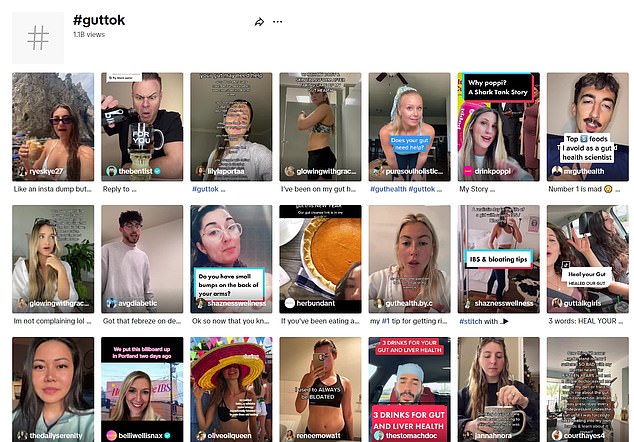A wave of US teens are using laxatives like ‘budget Ozempic’ as part of the TikTok trend – causing a shortage of stool softening drugs
Miralax, one of the most popular fiber supplements, is becoming difficult to obtain
A wave of American teens are using laxatives as a “budget Ozempic” to feel thinner, contributing to a shortage of stool-loosening drugs.
Demand for polyethylene glycol 3350, the generic name for laxatives such as Miralax and Glycolax, is starting to exceed supply.
The teens’ turn to laxatives could mean that people who actually need them to treat real constipation don’t have access to the drug, such as people with Crohn’s disease.
Laxatives may give the appearance of short-term weight loss, but only water weight is lost and regained when a person drinks again.
An aging population in America, as well as a general lack of fiber in diets, is also causing the shortage of laxatives.

The hashtag #guttok has been viewed more than 1.1 billion times on TikTok


A wave of US teens are using laxatives as a ‘budget Ozempic’ to feel thinner, contributing to a shortage of stool-loosening drugs
Eating disorder specialist Dr. Jenna DiLossi shared Wall Street Journal she had seen a sharp increase in the number of teenage patients abusing laxatives over the past two years, with some treating it as an over-the-counter form of Ozempic.
Laxatives are medications that loosen stool and promote bowel movements and are used to treat and prevent constipation. They work by drawing in water or physically stimulating the colon to contract.
Some people may think that laxatives will help them poop out what they have eaten before the body absorbs the calories, meaning they will lose weight.
But this is not true. The food we eat goes through many processes before it reaches your intestines and becomes stool.
The body absorbs the calories, fat and most nutrients before they reach the colon.
What remains is mainly water and some minerals that your body does not need. Some of it is absorbed by the body in the large intestine.
When someone uses laxatives and loses weight, they only lose water. As soon as they drink something, they regain their weight.
Before the pandemic, Dr. DiLossi said new clients rarely responded “yes” to laxative use on intake surveys.
The Pennsylvania clinical psychologist said that now at least three of the five new teens she typically sees per week admit to trying a laxative to lose weight.
“When people have excessive bowel movements and feel completely empty inside, it is shrouded in thinness and health,” she said.
Dr. DiLossi said teens told her they got the idea to try laxatives from TikTok, where the hashtag #GutTok has 1.1 billion views.
She said that even the videos that don’t directly promote laxatives for weight loss still support the idea that going to the bathroom more often is better for you.
According to analytics firm Pattern, searches for laxative pills on Amazon have more than tripled in the past year.
Meanwhile, the companies that produce the fiber supplements Metamucil and Benefiber have reported huge sales growth in recent years.
Dow Chemical, which makes pharmaceutical ingredients for drug companies, is building new factories that workers say are partly intended to produce more polyethylene glycol — the laxative that has been difficult to obtain since the pandemic. Polyethylene glycol is also used in cleaning products and moisturizers.
Surprisingly, more and more younger customers are using fiber supplements, suppliers say.
Haleon, the manufacturer of Benefiber, a popular plant-based fiber supplement, said 18-42 year olds are using the supplement at higher rates than ever.
Jissan Cherian, head of marketing at Haleon, noting that the message hasn’t changed, said: “The demand has changed.”
He thinks this move is due to millennials’ increasing focus on wellness and an increasing awareness of the relationship between gut bacteria and depression.
Earlier this year, Haleon launched a gummy version of its product aimed specifically at young adults.
